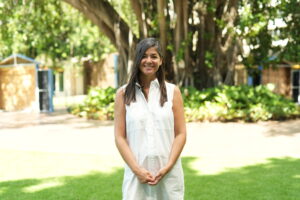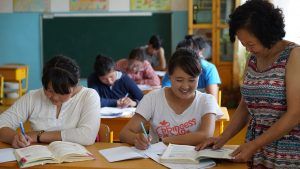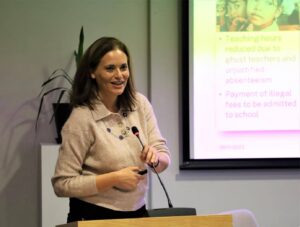Faces of Open Government: Muriel Poisson
Rostros de Gobierno Abierto: Cynthia Dehesa
Meet Muriel Poisson from UNESCO’s International Institute for Educational Planning (IIEP). Muriel has been at the forefront of research and initiatives that explore the vital links between open government practices and transparency within the educational system and on this International Day of Education, she shares her insights into the intersection between educationAccountability within the public education system is key to improving outcomes and attainment, and accountability is nearly impossible without transparent policies and opportunities for participation ... and open government.
Can you tell us more about the International Institute for Educational Planning (IIEP) and your role in it?
Over the past 60 years, the UNESCO International Institute for Educational Planning (IIEP-UNESCO) has supported nearly every country in the world with capacity development to better plan and manage their education systems.
Through knowledge production, training, and technical cooperation, IIEP contributes to the design and implementation of education sector plans, which reflect country needs, and international education goals.
We know that the only way to reach these goals is by eradicating corruption in the education sector. That is why over the past two decades, I have helped establish and lead IIEP’s work on ethics and corruption in education, training some 3,000 education professionals in anti-corruption measures and producing a range of knowledge products. I have also provided technical support to UNESCO Member States to help them for instance implement a public expenditure tracking survey or develop a teacher code of conduct.
As Task Manager of IIEP’s program on Ethics and Corruption in Education, can you explain to us how open government relates to education and what are the key benefits open government can bring to the educational sector and communities?
In the context of education, open government entails making government data, processes, and decisions accessible to the public, so that citizens’ right to education can be protected and scrutinized. Just like other public sectors, this enhances transparencyAccording to OGP’s Articles of Governance, transparency occurs when “government-held information (including on activities and decisions) is open, comprehensive, timely, freely available to the pub... More and accountability, and can help strengthen public trust in essential services. Making information available to the public and involving more people can make policies and reforms more relevant. This also ensures that resources reach the right people.
We have seen many inspiring examples of this – like Madagascar’s open policy, Colombia’s open contracting for school meals, or India’s widespread social audits. Open government can take many forms, but the goal remains the same: to make the vulnerable visible, to empower the least heard, and to encourage a shift in power dynamics within the sector.
How can platforms like OGP help to promote and improve transparency and accountability in education?
As a partnership involving government and civil society organizations, OGP contributes to developing a conducive environment for more transparency and accountability in the education sector. More specifically, according to an internal review of OGP action plans from 60 countries over the period 2011-2019 that we carried out at IIEP, such plans contained 295 education-related commitments. The main themes covered ranged from anti-corruption education, or citizenship education, to open educational resources, e-government, and education service delivery.
But it would be interesting to see how other open government-related topics relevant for the education sector – such as open school data, open budgeting, open contractingA transparent procurement process, known as open contracting, increases competition, improves public service delivery, and ensures governments better value for their money. Technical specifications: C... More, social auditing, and much more – can also be considered as part of OGP actions plans; either national or local. I also see country OGP points of contact as key players to make the link with education authorities and other stakeholders on the ground and help promote open government on the education agenda.
In your experience, what role does open school data play in promoting open government in education, and how can it benefit both students and the public?
Open school data is an extremely powerful tool to operationalize open government. For a long time, school-level data – from budgets, numbers of teachers, and availability of facilities, to learning outcomes – were only in the hands of public administrations. But this is no longer the case: over 50 countries make their data available to the public including highly populated countries such as Bangladesh, India, and Indonesia.
When this kind of data moves into the public arena and there is a proper feedback loop in place, then evidence shows that it can positively contribute to substantial changes in power dynamics within the education sector.
What challenges have you encountered when implementing open government practices in the education sector, and how were they overcome?
One of the most prevalent challenges is that giving information to citizens about their education system is not enough. Our research at IIEP has shown that citizens need to be accompanied and supported throughout the process to make the data work for them. But information and participation alone aren’t sufficient. It’s crucial to promote a plurality of voices and ensure that public authorities act on citizen feedback.
It is also important to involve students in open government processes, yet this is often overlooked. Students have a lot to say and are the ultimate beneficiaries of educational services, so their participation should be guaranteed. There are good examples of participatory budget initiatives involving students in Portugal for instance, or of a youth auditors’ programme in Peru, to learn from in this perspective.
What advice would you give to OGP members who would like to make education more transparent and corruption-free?
On the administrative side, my advice would be to consider ways to shift towards a citizen-centred approach, learning from the experience gained by civil society in the area. I would encourage both governments and civil society organizations to explore new opportunities opened by digital tools to foster greater participation and accountability.
For all those engaged or willing to engage in this direction, my advice would be to understand the benefits and risks of digital tools – including misinterpretation of data, or security issues – so that the transition towards a more open system has the best chance of fostering positive results.
Lastly, as there are so many initiatives in action worldwide to scale up or replicate, I can’t emphasize enough the need to learn from peers and promote knowledge sharing at regional and international levels.
Conoce a Cynthia Dehesa, la Directora de Ciudadan@s por la Transparencia, una organización de la sociedad civil que trabaja para construir una sociedad con tolerancia cero a la corrupción a través de iniciativas de gobierno abierto y ciudadanía activa en el estado de Quintana Roo, México.
En conmemoración del Día Internacional contra la Corrupción, Cynthia nos va a ayudar a entender mejorla importancia y la trayectoria de su trabajo en la búsqueda de una sociedad más justa y transparente.
- ¿Por qué es importante luchar contra la corrupción y cómo impacta directamente en el bienestar de la comunidad a nivel local?
Porque rompe todos los acuerdos sociales sobre cómo nos vamos a relacionar, cómo vamos a manejar los recursos. Cuando hay corrupción, una de las partes rompe esos acuerdos. Entonces nosotros combatimos la corrupción para evitar o prevenir que haya actores que rompan lo que debería de funcionar para toda la sociedad.
La corrupción afecta directamente a nivel local porque es donde los recursos más se necesitan y más se visibilizan. A nivel municipal, la desaparición de recursos tiene un impacto directo en la calidad de vida de las personas. Cuando los recursos desaparecen, dejan de invertirse en cosas que facilitan la calidad de vida de las personas. En el caso de Quintana Roo, que tenemos parques en el centro de las comunidades, cuando desaparecen los recursos, estos espacios, en vez de ser espacios de convivencia, de conexión con la naturaleza y de generación de bienestar, se convierten en espacios inseguros.
- Ciudadan@s por la Transparencia busca construir una sociedad con cero tolerancia a la corrupción. ¿Qué iniciativas lo están logrando?
La organización que dirijo busca construir una sociedad con cero tolerancia a la corrupción a través de diversas iniciativas. Una de ellas es la promoción de la integridad empresarial, destacando la importancia de normativas legales que responsabilicen a empresas extranjeras por actos de corrupción incluso fuera de su territorio.
Además, nos enfocamos en la vigilancia del recurso público, siendo conscientes de que aquí es donde más se manifiesta la corrupción. Implementamos programas municipales anticorrupción en varios municipios, reconociendo la necesidad de abordar la corrupción desde la realidad local. Estos programas son co-creados con la participación activa de la sociedad civil y los servidores públicos municipales, permitiendo acciones más efectivas y específicas.
También nos adentramos en la planeación local, buscando que la población comprenda cómo la corrupción impacta directamente en sus vidas. Trabajamos para que la corrupción deje de ser percibida como algo lejano y abstracto, involucrando a la comunidad en la identificación y solución de problemas locales.
Estas acciones se materializan en programas concretos, como los programas municipales anticorrupción, que se integran en los planes de desarrollo gubernamentales, asegurando su seguimiento y rendición de cuentas. En Benito Juárez, por ejemplo, hemos implementado un plan municipal anticorrupción como parte del Plan Municipal de Desarrollo, obligando a las autoridades a informar públicamente sobre los avances y logros obtenidos. Estas iniciativas buscan no solo combatir la corrupción a nivel local, sino también construir una sociedad donde la tolerancia a la corrupción sea mínima, gracias a la participación activa y consciente de la ciudadanía.
- ¿Cómo les ha ayudado el gobierno abierto y la Alianza por el Gobierno Abierto (OGP por sus siglas en inglés) a luchar contra la corrupción?
Cuando comenzamos con el tema de gobierno abierto no tenía ninguna expectativa. Pensaba que lograr un cambio real y una verdadera voluntad por parte del gobierno era casi imposible. Ahora no solamente hemos implementado nuestro ejercicio formal de gobierno abierto, sino que también hemos extendido la transparencia a otros procesos, como el parlamento abierto y la creación de planes municipales. El gobierno abierto nos brinda un espacio para reconectar el gobierno con la sociedad civil y facilita el diálogo entre las y los servidores públicos y la ciudadanía, disminuyendo la desconfianza acumulada por años de corrupción.
Este espacio educativo también ha revelado las complejidades del sistema político y la falta de procesos educativos bien estructurados. Las leyes, a menudo incomprensibles, contribuyen a la falta de comprensión del sistema legal. En el ámbito de gobierno abierto, se trabaja para simplificar mensajes, ciudadanizar procesos y mejorar la comprensión del sistema, generando más interés y compromiso por parte de la sociedad civil.
Un ejemplo destacado es la Plataforma de Transparencia Presupuestaria, que ha evolucionado desde un PDF inaccesible a una plataforma diseñada en lenguaje ciudadano. La experiencia del usuario ha mejorado, comprometiéndose a resolver problemas identificados en el presupuesto a través de compromisos firmados en el marco del gobierno abierto. Este ejercicio demuestra cómo la transparencia y la participación ciudadana impactan directamente en la mejora del gobierno y en la lucha contra la corrupción.
Contar con el respaldo internacional de OGP es esencial para quienes trabajamos a nivel local. Nos ofrece tres beneficios clave:
- Brinda protección y seguridad al demostrar que no estamos solos; hay una audiencia internacional observando nuestras acciones.
- Facilita el intercambio de conocimientos y experiencias, permitiendo adoptar mejores prácticas y aprender de otros. Por ejemplo, las Cumbres de OGP pueden plantear dudas. Su valor radica en abrir nuevas perspectivas y oportunidades que de otra manera serían inaccesibles.
- La Alianza valida nuestro conocimiento frente a las autoridades locales, proporcionando un respaldo que fortalece nuestra posición política al presentar resultados a nivel internacional.
- En febrero de 2023, Ciudadan@s por la Transparencia instaló una mesa de co-creación de anticorrupción y medio ambiente. ¿Por qué es importante luchar contra la corrupción en temas medioambientales?
Porque el medio ambiente está siendo destruido y los países no están alcanzando sus objetivos por corrupción y falta de compromisos con las metas climáticas.
En esa mesa medioambiental hemos logrado transparentar manifestaciones de impacto ambiental y bitácoras ambientales que no se habían hecho públicas en varios años. A pesar de la resistencia inicial, nuestra organización ha tejido relaciones que nos permitieron transparentar la información. Trabajamos para que todas las manifestaciones de impacto ambiental sean virtuales, enfocándonos en publicar no solo el listado, sino toda la información relevante.
Además, planeamos implementar consultas ciudadanas para abordar problemas identificados en manifestaciones con impacto negativo. Sensibilizar al sector privado es crucial, especialmente en la construcción desmedida que afecta al medio ambiente. Abordamos tres frentes:
- Anticorrupción
- Integridad empresarial
- Planeación responsable para invertir eficazmente y reducir las posibilidades de corrupción.
La sociedad exige resultados tangibles, creando un entorno menos propenso a malversaciones.
Comments (4)
Crédo Cédric Assogba Reply
Great
Muhammad Arif Reply
I learnt new experience open school data this is very powerful rool if it is used in such way. I like this and follow this idea.
Sophanna KANG Reply
It is great to learn about the open school data from your expertise. Thank you.
Leave a Reply
Related Content
 Champions
Champions
Faces of Open Government: Cynthia Dehesa
Meet Cynthia Dehesa, the Director of Citizens for Transparency, a civil society organization working to build a society with zero tolerance for corruption through open government and active citizenship in…
 Champions
Champions
Faces of Open Government: Sarah Wesonga
Meet Sarah Wesonga, Program Officer for Transparency and Access to Information at ARTICLE 19 Eastern Africa.

Education
Many OGP governments work to make education information more transparent, to directly engage citizens in improving quality, and to ensure appropriate accountability.


Zarook Abdul Reply
very useful